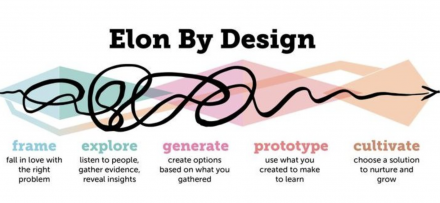The 2022 Design Thinking Community of Practice supports faculty projects infusing design thinking across the curriculum.
On Friday, April 29, Elon’s Center for Design Thinking hosted a showcase hour celebrating the innovative pedagogical designs from the 2022 Design Thinking Community of Practice (DTCoP).
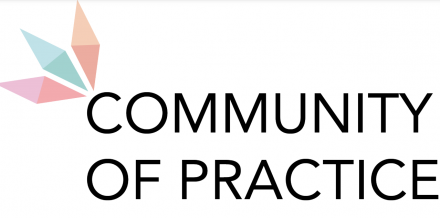
Faculty design thinking curricular projects were incredibly diverse. Some faculty infused design thinking into syllabi, schedules and class assignments, while others created poster projects, community-based learning projects and entire programs of study with design thinking processes.
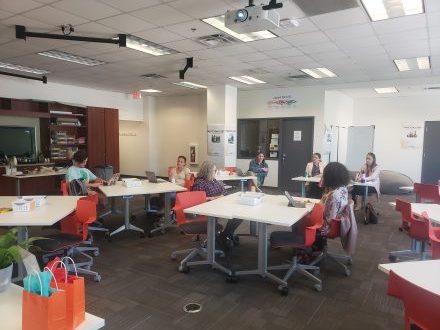
Over the past two years, the DTCoP has been supporting faculty committed to infusing equity-centered design thinking practices into their courses. Members participate in regular meetings led by Tracey Thurnes, Design Thinking Curricular Catalyst and associate professor of Physician Assistant Studies and Danielle Lake, director of Design Thinking. Together the group explores, generates and prototypes best practices for infusing design thinking methods and processes into their classes.
This year, DTCoP member and Associate Professor of Engineering Bethany Brinkman reimagined not one, but two student projects, infusing playful learning as well as real-world scenarios and poster presentations to help students visualize their recommendations to clients. Brinkman’s work highlighted for students the importance of contextualization and ethical preparation needed for the future of engineering.
Svetlana Nepocatych, associate professor in Exercise Science, integrated design thinking practices into her Exercise Testing and Prescription course by using design thinking language and methodology in a semester-long project to help her students design exercise programs that genuinely meet client needs. This project provided students with the time and opportunity to prototype and cultivate their prescriptive plans in relationship with their clients, allowing valuable space for implementation and feedback.
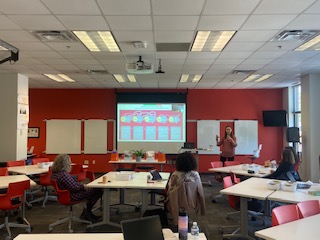
Antoinette Polito, associate professor of Physician Assistant Studies, used design thinking processes to engage students in course redesign. She invited former students in as partners, asking for their insights on what was most useful in the course and what wasn’t.
Polito also implemented a liquid syllabus as a way to more deeply engage students. She reinforced that you do not have to be involved in a large, ambitious project to get involved with the Design Thinking Community of Practice. You can take on a curricular redesign project you need to complete anyway and use the support and resources of the DTCoP to see it through.
Pursuing a similar approach, Assistant Professor in Cinema and Television Arts Kai Swanson’s project focused on inclusive, learner-centered syllabus. She identified key transformative moments in the semester to invite students to engage with and in the course. Especially powerful in her design thinking revisions is the focus on tiny tasks and incremental interventions for supporting engagement in an inclusive classroom.
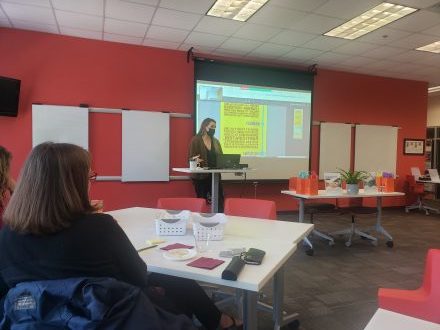
Design thinking student catalyst Kendall Gilbert ’22 expressed appreciation for Swanson’s focus on inclusion.
“Professor Swanson recognized the value of paying attention to small details in order to create space for what will benefit and maximize student learning,” Gilbert said.
Graduate Director of the Master of Higher Education Program Rozana Carducci infused design thinking across the entire MHE program, from orientation to the capstone, providing design thinking protocols to support “real wicked” challenges within higher education.
Carducci will be infusing intermittent journal reflections and SoTL projects to help students reflect upon what they are learning and how these projects are transforming their mindsets.
Carducci’s efforts over the past two years have been particularly transformative for the MHE program and for fellow DTCoP members. The Center is excited to welcome her as the 2023 Design Thinking Cocurricular Catalyst and the DTCoP faculty facilitator. She will replace Tracey Thurnes, who has served in the role for two years and will be transitioning to the role of Research Catalyst for the Center.
The 2023 DTCoP is open to any faculty (including faculty teams) interested in applying Design Thinking pedagogies in order to foster inclusive, equitable, and transformational, project-based learning. Time and space is devoted to each member’s goals! To learn more and get involved reach out to Danielle Lake at dlake@elon.edu
